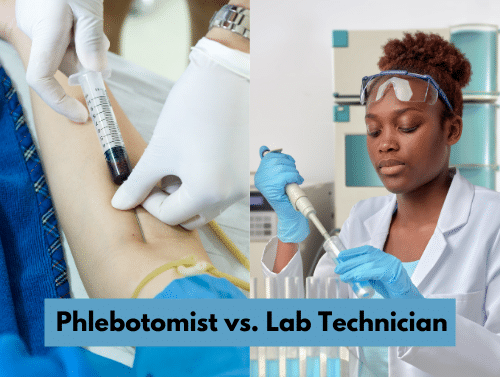With increasing demand in healthcare, the need for professionals in the diagnosis process has increased rapidly. Medical lab technicians and phlebotomists play a crucial role in the overall healthcare system.
Many branches in healthcare use professionals with varied skills, and medical laboratory has similar progression. Medical lab technicians and phlebotomists have many similar duties, and the term is used interchangeably. Lab technicians and phlebotomists work under the supervision of laboratory technologists, and collectively this branch represents the broad range of clinical expertise.
What is Phlebotomist?
A phlebotomist is a healthcare professional who collects blood samples from patients. They are an essential part of the medical field, as blood tests are used to diagnose a wide range of medical conditions, monitor treatment progress, and screen for potential health problems.
What is Lab Technician?
Lab technicians, also known as clinical laboratory technicians, are the backbone of medical laboratories and research facilities. They play a crucial role in healthcare by performing a wide range of tasks, from collecting and processing medical samples to analyzing data and preparing reports.
Responsibilities of Lab Technicians vs. Phlebotomists
Both lab technicians and phlebotomists collect bodily fluids from patients. But phlebotomists only work with blood, while lab technicians usually work with different bodily fluids, including blood. Phlebotomists only take blood samples and perform clerical work such as storing supplies and printing. However, lab technicians help technologists collect and run tests in the laboratory.
Job Responsibilities include:
Phlebotomists
- Gather all medical instruments before drawing blood.
- Draw blood from patients
- Calm nervous patients by explaining the process
- Verify the patient’s identity and put the correct label on each sample.
- Record patient information in the database.
- Ensure cleanliness and personal hygiene.
- Minimizing the number of draws and use equipment carefully.
- Sanitizing space and equipment to draw blood.
Lab Technicians
- Take bodily fluid samples from patients, such as urine, tissue, and blood.
- Coordinate with lab technologists to analyze samples.
- Recording data and clinical results in patient records.
- Using automated equipment to perform many tasks at once.
- Keeping and recording any abnormal findings.
- Learn and get trained by lab technologists.
Work Settings
Both lab technicians and phlebotomists work in hospitals or laboratories to take samples from patients. Many phlebotomists work for mobile blood donation centers, lab technicians, however, help lab technologists collect samples and run tests in the laboratory.
Education Requirements
To work as a phlebotomist, one must be a mature student, have a high school diploma and a certification from an authorized institution. One can start working as a phlebotomist in less than three months.
To pursue a medical lab technician career, one must have a high school diploma and professional diploma or associate degree. In addition to primary education, one has to achieve certification from the regulatory body. In Ontario, medical lab technicians must clear MLPAO certification.
Job Outlook and Salary
According to Job Bank Canada, the job outlook for both phlebotomists and lab technicians is good. With increasing pressure on the testing and diagnosis process in major cities in Canada, demand for medical professionals has increased by 85%.
The average wage for phlebotomists in Canada is $18.88/hourly. The average salary for lab technicians in Canada is $29.87/hourly. For a detailed province-wide report, click here.
How to get started?
Biztech college focuses on the students’ job readiness and offers short duration, cost-effective, and career-oriented diploma and certificate programs in healthcare.
Phlebotomy certification courses equip students with essential skills to draw blood and other specimens in medical settings, using proper techniques and precautions. This 4-day course will help you to enter a healthcare career and gain experience.
Medical Laboratory Assistant/Technician diploma at the college equips students with in-depth medical lab safety procedures, medical terminology, anatomical pathology, phlebotomy, how to perform and interpret electrocardiograms (ECG), and more. Hands-on training with qualified professionals during clinical placements will prepare applicants to pursue a rewarding career.
Talk to our admission advisors to know about career opportunities, financial aid, and more. Contact us.
Frequently Asked Questions (FAQs)
What are the types of phlebotomy?
Venipuncture
Capillary puncture
Arterial puncture
What does phlebotomy treat?
Phlebotomy treat excess iron in blood called hemochromatosis & excess red blood cells in blood called polycythemia.
Is lab technician a good career?
The job security is the major part of pursuing the career as the lab technician with healthcare being the most essential service. The skills acquired during this course are in demand, ensuring the rewarding and stable career path.
Is a lab technician a doctor or not?
Medical lab technicians are healthcare practitioners that work alongside physicians but are not doctors. A medical technician can become a doctor by enrolling in medical school and completing their study in their chosen profession.
